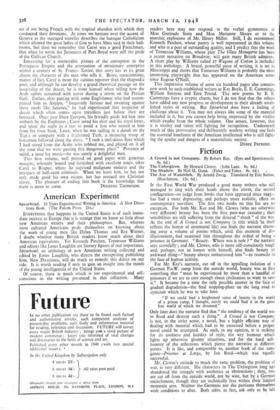American Experiment
Spearhead. 10 Years Experimental Writing in America. A New Direc- tions Book. (The Falcon Press. 21s.)
EVERYTHING that happens in the United States is of such imme- diate interest to Europe that it is strange that we know so little about new American writers and their philosophies. But, whereas most cultured Americans pride themselves on knowing about the work of young men like Dylan Thomas and Rex Warner, I doubt whether many British readers know much about their American equivalents. Yet Kenneth Patchen, Tennessee Williams and editors like James Laughlin are literary figures of real importance. Spearhead, an anthology of new American writing collected and edited by James Laughlin, who directs the enterprising publishing firm, New Directions, will do much to remedy this defect on our side. It is worth reading if only to gain an. insight into the minds of the young intelligentsia of the United States.
Of course, there is much which is too experimental and self- • conscious in the writing presented in this collection. Many
readers here may not respond to the verbal gymnastics of Miss Gertrude Stein and Miss Marianne Moore or to the anarchic, explosions of Mr. Henry Miller. Still, I do recommend Kenneth Patchen, whose poetry is well represented in this volume and who is a poet of outstanding quality, and I predict that the work of Tennessee Williams' whose play The Glass Menagerie has been a recent sensation on Broadway, will gain many British admirers. A short play by Williams called 27 Wagons of Cotton is included in this anthology. A brutal, powerful piece of writing, it is set in Mississippi and shows that Tennessee Williams is piobalbly the most interesting playwright that has -appeared on the American scene since Eugene O'Neill.
This impressive volume of some six hundred pages also contains new work by such established writers as Kay Boyle, E. E. Cummings, William Saroyan and Ezra Pound. The new poems by E. E. Cummings have a cryptic charm, but I do not find that the others have added any new progress or development to their already estab- lished styles of writing.. But Spearhead does have a feeling of challenge about it. You may not always like some of the material included in it, but you cannot help being impressed by the vitality which exudes from the whole volume. One senses, however, that it is vitality and talent still fighting for recognition. Underneath much of this provocative and deliberately modem writing one feels the essential loneliness of the American intellectual who is still fight- ing the apathy and dangers of a materialistic society.
DEREK PATMORE.


































 Previous page
Previous page